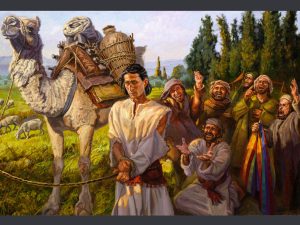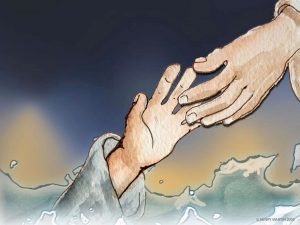Rachael writes: Many of us will know the trials and tribulations of sibling rivalry. Even last Sunday afternoon, as my brother and I (30 and 32 years old respectively) were taking some things from the rectory to the church hall, my dad walked off saying “I’ll leave you two to it, you get on better without us around anyway!”. It is simply an accepted fact in our family now, after years – decades even – of childhood squabbles, and teenage stand offs, that if we’re not vying for mum and dad’s attention, my brother and I can actually get on quite well. So, forgive me if I am projecting my personal experience too far but I do believe we’re not the only ones and that many, if not most, families experience this kind of tension between siblings for their parents’ attention and affection.
Joseph and his brothers, however, take it to another level (Genesis 37.1-4, 12-28). I can’t say I’ve ever actually thrown my brother into a pit, nor sold him to passing traders, though the thought may have crossed my mind at times. But such is the brothers’ animosity towards Joseph that they want to kill him and end up selling him off as a slave!

The lectionary means that we are going to cut thirteen chapters of Genesis, and a two-hour Andrew Lloyd Webber musical mega-hit, into two brief readings. We’re going to miss out the baker and the butler, potipher’s wife, dreams of famine and plenty, and next week jump straight to the brothers standing before Joseph, begging for food and their lives. We miss out decades of his life, decades that he spends in a kind of wilderness, as a foreigner with no status, cast out from his family and away from his land. Remember, he is seventeen when his own brothers fake his death and sell him as a slave.
I see some similarities between Joseph and Peter (Matthew 14.22-33). They’re both gifted, though perhaps not always wise. They are both destined for great things but need a little refinement before they get there. And in both stories that we hear about them today, they end up in the wilderness.
We often admire Peter, first because he has the faith to get out of the boat and then because he falters and starts to sink. We take comfort from “The Rock” on whom Christ will build his Church having a moment of weakness, knowing that we would likely go the same way.
Often, we skim over the fact that Peter steps out on the water while the storm is still raging around him. Sunday school pictures of a serene, lightly glowing Jesus, gliding like one of Dr Who’s daleks don’t help. Peter gets out of the boat into a wild sea. Into a literal wilderness.
I suspect that, like sibling rivalries, I’m not overstretching when I suggest that most of us know what it is to experience a personal wilderness. Whether it’s a bleak and inhospitable period, or a time of turbulence and disorder, like Joseph and Peter most of us have had to go there at some point, perhaps frequently, perhaps we find ourselves there now.
Eugene Peterson, pastor, author, and bible translator, calls his own experience of this “the Badlands”. He describes it as a kind of malaise, a featureless aridity, as if the colour had drained out of the vocation he had been so passionate about and the congregation that had been so full of life. But as he comes to terms with this period in his life and ministry, he says of it “there is a Badlands beauty that can only be perceived in the bad lands”.
The over arching theme of our readings at the moment is getting involved in God’s work in the world, in being part of the growth of the Kingdom, the transformation of all things, the redemptive work of the Spirit. But sometimes, especially if you’ve been working hard at it for a while, the fire within you which once spurred you on, can become dim – it may even flicker out. Sometimes we can identify why we end up in the wilderness, and sometimes the Badlands feel as though they’ve crept up on us. And we can be frustrated by that, even having a sense that this is somehow unjust. Surely our faith should exclude us from the wilderness experience. Surely if we’re just good enough, faithful enough, holy enough, we shouldn’t have to face suffering or danger or challenge.
But life with Christ cannot be reduced to “protection from danger” nor is faithfulness to God a religion of guaranteed happy ending (at least, certainly not in this life). Rather, if we look at the bible as a whole – the story of the people of Israel, the ministry of Jesus, and the life of the early church – we see the co-existence of danger and promise. We see wilderness: the wide open space of possibility and the desolate place of pain and darkness. And there, the people are continually brought back to relationship with God.

Joseph goes into the pit and then the hands of slave-traders: danger. He goes with a gift of interpretation and dreams of his future status: promise. Peter steps out into the storm: danger. Jesus is there on the water with him: promise. God is in the wilderness too, calling us to relationship, and asking us to trust.
At the start of our gospel passage, Jesus shows us something of how we can handle the Badlands. Matthew 14.23: “he went up the mountain by himself to pray. When evening came, he was there alone”. I find that the wilds usually force us to slow down: they’re like quicksand or a good Scottish peat bog. There’s no rushing to the other side. If you push, you sink further. But, if we give time to contemplation and prayer. And if we accept, welcome even, the opportunity to slow down, then we might find that we are indeed walking with God and learning that in danger and promise, there is love.
I wonder what that looks like for each of us? What does it look like to slow down? To meet God in the in the desert, or on the waves, of the wilderness?
And how might doing so transform our relationship with God and change the way that we share God’s love in the world?
Open your merciful ears, O Lord,
to the prayers of your humble servants:
and, that you would graciously grant what we ask,
make us desire what is pleasing in your sight;
through Jesus Christ, our Lord, who lives and reigns with you,
in the unity of the Holy Spirit,
God, world without end. Amen.






